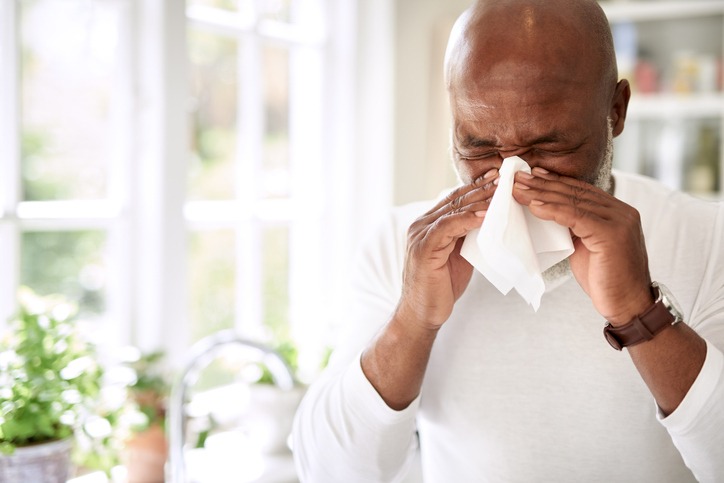As winter turns into spring, the sun begins to shine and the songs of baby birds fill the air. For many, Spring doesn't just mean beautiful flowers and baby birds, but it also means more pollen in the air and the itchy eyes and non-stop sneezing that come with pollen allergies. These tiny grains are released into the air by trees, grasses, and weeds to fertilize other plants. When they get into the nose of someone with a pollen allergy, they throw the body's defenses into overdrive. Pollen can travel for miles, so don't blame the plants in your neighborhood for your allergies. Spoor's Heating & Air Conditioning is here to give you some tips on how to keep pollen out of your house and help you not have a miserable spring.
Contact us today to learn more about what we can do to increase your indoor air quality.

Strip Any Outerwear
From the minute someone leaves their house or apartment, pollen can cling to them like a magnet. The best way to not track pollen through the house when you get home is to designate a part of the entryway to remove your outerwear before going all the way inside. This includes articles of clothing like sweaters, shoes, coats, and whatever else may be coated in pollen. Try to get into the habit of removing these clothing items every time you enter the house because consistency is key when it comes to keeping out the pollen.
Park In A Garage
A common sight in Spring is a yellow-coated car, whether it's someone else's car who is driving around or your car after it was left in the driveway. While not every house or apartment has a garage, if there is one parking in it will not only help your allergies but will also help to preserve the exterior of your car. Cars can pick up pollen from just driving around or from parking in any area where trees or plants that can produce pollen are nearby. If you don't have a garage, we recommend rinsing down your car every other day to help you get rid of any unwanted allergens.
Keep Your Windows & Doors Closed
Open doors and windows are an open invitation for pollen to enter your home. It is especially important to keep them closed during peak pollen hours, which is typically early in the morning and in the evenings. If you want to get some fresh air by opening a window, make sure to check your local pollen forecast for days when pollen levels are low. On days like that, you can normally get away with enjoying some fresh air without the worry of pollen sneaking in.
Dry Your Clothes Indoors
The warm weather or the spring and summer months makes it pretty tempting to dry your clothes outdoors. While this is normally a great way to save some time and money, especially for renters who don't have in-unit laundry, the most pleasant times of the year are the worst for pollen. If you have a high pollen count in your area, we recommend only drying your clothes outdoors before and after pollen season, otherwise, pollen can get stuck on your drying clothes and brought into your home.
Brush Your Pets
While we love our furry friends, pets are the perfect carrier for pollen. Just like how pollen spores can stick to your hair, as your pets move in and out of your house, pollen can stick to not only their fur but also to their paws. To stop them from bringing these allergens into your home, we recommend brushing your pets outside before letting them in the house and wiping off their paws each time they approach the door.
Invest In A HEPA Filter
As a homeowner or a renter, you probably already know to change your air filter pretty frequently, but some filters are better than others for collecting allergens. A High-Efficiency Particulate Air (HEPA) filter can remove 99.7% of airborne particles, including pollen. This will help to get all that pesky pollen out of your air, though there could still be pollen clinging to your rugs, bedding, and drapes.
Change Your Cleaning Habits
Instead of grabbing any old dry dust rag or feather duster, try using wet dusting techniques instead. This means wetting the rag or duster before you start to dust. Using a dry duster can rouse any settled allergens and get them floating in the air once again. Using that little bit of moisture to dust can keep the pollen dormant instead of in the air. If you do decide to use a dry duster, make sure to vacuum after the allergens settle on the floor. Regularly vacuuming and mopping are also great ways to get rid of pollen in the house.
Wash Your Hair Every Night
When thinking of allergens in your bed, dust mites are probably the first thing that comes to mind, but pollen can collect in your hair and transfer to the bedroom. Washing your hair before bed will help you get all those spores of pollen off your head and help you have a restful night of sleep without sneezing waking you up.
